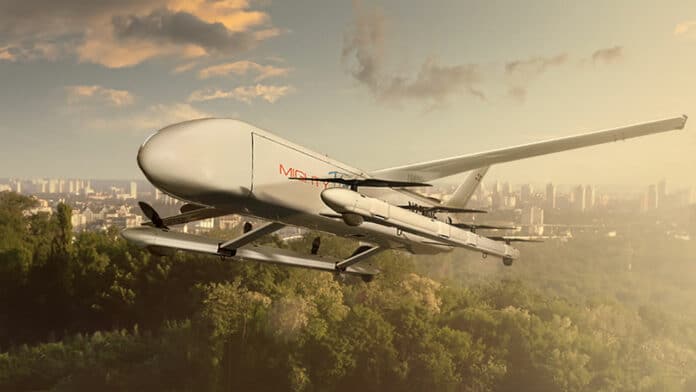Cargo delivery drone startup MightyFly has been selected by the U.S. Air Force’s emerging tech development unit, AFWERX, for further development of technology related to its autonomous hybrid eVTOL cargo aircraft.
The company has received a $1.25 million contract under the U.S. Air Force’s Small Business Innovation Research (SBIR) Phase II program. Under the agreement, the company will work to adapt its Autonomous Load Mastering System (ALMS) for its hybrid eVTOL cargo aircraft to load, unload, and deliver cargo autonomously and to address the most pressing expedited logistics challenges.
The Air Force Research Laboratory and AFWERX have partnered to streamline the Small Business Innovation Research (SBIR) and Small Business Technology Transfer (STTR) process by awarding contracts to small enterprises that are developing novel technology that has the potential to aid the Department of Defence (DoD).
With the new contract, MightyFly joins the ranks of advanced air mobility heavyweights like Archer and Joby, which have received similar grants to develop emerging tech created for civil air transport to potential military applications.
What attracted AFWERX geeks to MightyFly’s payload system is its fully autonomous and automated functionality. MightyFly’s ALMS allows MightyFly’s autonomous hybrid eVTOL cargo aircraft to load, unload, and deliver cargo autonomously.
The loading mechanism uses a conveyor belt to automatically gather freight from the ground and store it in its cargo compartment. Upon arrival at delivery destinations, the device securely deposits packages for retrieval without any human intervention, simplifying and speeding up the freight handling process.
MightyFly’s Autonomous Load Mastering System is poised to revolutionize logistics and delivery services by providing automation, efficiencies, and cost savings. It will allow MightyFly’s MF100 third-generation aircraft to deliver point-to-point, same-day, and expedited delivery services that are faster, more efficient, reliable, and economical than incumbent express logistics services.
This solution is well-suited for a wide range of industries, including logistics, supply chain, manufacturing, healthcare, pharmaceutical, retail, automotive, and oil and gas industries. It is also beneficial for National and State parks, humanitarian and disaster relief organizations, and defense and non-defense governmental agencies.
“The MightyFly team is working to revolutionize expedited logistics via large, autonomous, hybrid eVTOL cargo aircraft. To be chosen by AFWERX for this SBIR Phase II contract signifies a vote of confidence in our mission and technical expertise. We are honored to partner with the U.S. Air Force and to leverage our know-how to develop a system that directly addresses agile and expedited logistics needs and provides a major feature that is needed for the successful integration of autonomous aircraft within logistics,” said Manal Habib, CEO of MightyFly.
The selection of this payload conveyance tech by AFWERX for SBIR Phase II development is expected to be the start of MightyFly’s participation in the U.S. Air Force program, with the possibility of later inclusion of its hybrid cargo drones themselves.
MightyFly’s autonomous hybrid eVTOL cargo aircraft has a cargo capacity of 100 lbs (45 kg), a range of 600 miles (965 km), and a max speed of 150 mph (240 km/hr). It measures 13.1 ft by 16.7 ft (4 m by 5 m), taking up a total area that is less than two compact cars – meaning the ground transfer stations required onsite can simply be two car spots in an existing parking lot. MightyFly’s cargo drone is equipped with an internal cargo bay able to carry 96 small USPS packages.
The company is scheduled to complete the manufacturing of its third-generation MF100 aircraft later this year and is scheduled to publicly debut its autonomous cargo aircraft performing delivery flight demonstrations with 100 pounds of payload in Michigan in 2024. The eVTOL aircraft has a range of 600 miles (965 km) and a top speed of 150 mph (240 km/h).
